|
|
|
Sort Order |
|
|
|
Items / Page
|
|
|
|
|
|
|
| Srl | Item |
| 1 |
ID:
110108
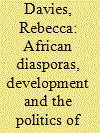

|
|
|
|
|
| Publication |
2012.
|
| Summary/Abstract |
This article seeks to add to the debate on the role of diasporas in development outcomes in sub-Saharan Africa by considering why diasporas are not apparently as effective as development agents in an African setting as they have proven thus far in other regions. It argues that changing diasporic engagement and activities on the continent should be examined against the backdrop of the emergence of a 'liberalisation from below' which emphasises local ownership of development outcomes, the historical variety of African state forms and the continuities in the exercise of power and the nature of these states. In so doing, it brings into focus the ongoing transformation in state-society relations whereby the dependence-of elites and ordinary citizens alike-on external resources continues to deepen, and the importance of this context in drawing any conclusions about the role of diasporas as agents of transformation.
|
|
|
|
|
|
|
|
|
|
|
|
|
|
|
|
| 2 |
ID:
186833
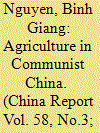

|
|
|
|
|
| Summary/Abstract |
This article examines the Communist Party of China’s (CPC) policies toward agriculture from an institutional perspective. Mao Zedong viewed the peasantry as allies of the CPC, and in order to socialise rural areas, he ordered massive collectivisation, attempting to manage the countryside and peasants with people’s communes and production brigades. Deng Xiaoping and Jiang Zemin responded to the dysfunction that followed with reforms and opening up, including the abolition of collectives and people’s communes, liberalising agriculture, and promoting incentives for labour. This led to its own complications, and efforts later by Hu Jintao and Xi Jinping have been directed towards resolving the ‘three rural issues’ – of agriculture, rural areas, and farmers – in order to achieve a ‘moderately prosperous society’ and the ‘great rejuvenation of the Chinese nation’. This article argues that while there is an emphasis on innovative policies and approaches, there is a lack of structural reforms owing to the CPC’s wish to remain in control of rural areas and peasant life.
|
|
|
|
|
|
|
|
|
|
|
|
|
|
|
|
| 3 |
ID:
051385
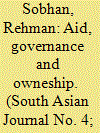

|
|
|
|
|
| Publication |
Apr-Jun 2004.
|
|
|
|
|
|
|
|
|
|
|
|
|
|
|
|
| 4 |
ID:
188744
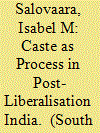

|
|
|
|
|
| Summary/Abstract |
The task of recent scholarship on India’s post-liberalisation period has been, in part, a re-casteing: a deliberate investigation of the ways in which historically embedded hierarchical divisions are continually reworked and thereby reinvigorated. Amid contemporary debates over the forms, sites and effects of caste and caste discrimination, this article identifies a shift in critical scholarship towards understandings of caste as process. Processual readings of caste within market- and merit-based institutions productively reframe caste in India from a ‘relic’ undergoing erosion to an accretion of new layers and logics upon older principles of innate human value.
|
|
|
|
|
|
|
|
|
|
|
|
|
|
|
|
| 5 |
ID:
150617


|
|
|
|
|
| Summary/Abstract |
European energy markets have undergone a major transformation as they have advanced towards market liberalisation and it is vital that the details of these developments be carefully examined. The success of liberalisation is based on smart regulation, which has been capable of providing solutions to unforeseen events in the process. Our paper seeks to contribute to existing understanding of the unexpected and collateral effects of the liberalisation process in the power system by examining a natural experiment that occurred in Spain in 2009. In that year, the electricity supply by distribution system operators disappeared. This change in retail market competition, as we demonstrate in this paper, has had an unexpected effect in terms of the system’s balancing requirements. We undertake a rigorous assessment of the economic consequences of this policy change for the whole system, in terms of its impact on final electricity prices.
|
|
|
|
|
|
|
|
|
|
|
|
|
|
|
|
| 6 |
ID:
001934
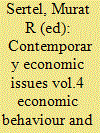

|
|
|
|
|
| Publication |
London, Macmillan, 1999.
|
| Description |
xxiv,261p.
|
| Standard Number |
0333698088
|
|
|
|
|
|
|
|
|
|
|
|
Copies: C:1/I:0,R:0,Q:0
Circulation
| Accession# | Call# | Current Location | Status | Policy | Location |
| 043109 | 330/SER 043109 | Main | On Shelf | General | |
|
|
|
|
| 7 |
ID:
127104
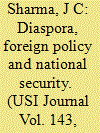

|
|
|
| 8 |
ID:
076929


|
|
|
|
|
| Publication |
2007.
|
| Summary/Abstract |
Well over 4,000 unauthorised migrants have lost their lives in the U.S.-Mexico border region since 1995. These deaths have occurred at the intersection of a dramatically strengthened U.S. boundary policing enforcement apparatus and persistent and arguably growing out-migratory pressures in Mexico and beyond. A number of the deceased have come from coffee-growing and -harvesting households and regions in Mexico and Central America, areas devastated by unstable commodity prices that reached their lowest point in a century in 2000-2001. This article explores the discursive and empirical interrelationship between a neoliberalised international coffee market, an increasingly policed U.S.-Mexico boundary, and migrant deaths. In doing so, it finds evidence to suggest that there is a causal link between the international crisis in prices received by coffee bean producers, out-migration by individuals in households and communities dependent on the coffee sector for their livelihoods, and migrant fatalities. It thus illustrates that the age of neoliberalism is one in which processes of nationalisation, liberalisation, and regulation exist simultaneously in space and time, the intersection of which in a world of deep inequality sometimes produces untimely death for those on the global socio-economic margins. Finally, the article highlights the limitations of extant research on this matter and lays out an agenda for future investigation
|
|
|
|
|
|
|
|
|
|
|
|
|
|
|
|
| 9 |
ID:
153133
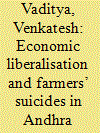

|
|
|
|
|
| Summary/Abstract |
Adversely affected by globalisation and state-based policy changes, India’s agricultural sector has recently experienced a marked increase in farmer suicides, most prominently in Andhra Pradesh (AP). This article examines the various policy changes leading to such agrarian distress and seeks to explore how the troubling phenomenon of farmers’ suicides may be curbed.
|
|
|
|
|
|
|
|
|
|
|
|
|
|
|
|
| 10 |
ID:
158645


|
|
|
|
|
| Summary/Abstract |
In the Democratic Republic of Congo, donors promoted rapid liberalisation and presidential elections in the aftermath of the war, and after two terms, President Kabila has not left office. This article engages with the question of how liberalisation and elections are connected, and how they are related to the extension of presidential power. It finds that the international market for minerals has shaped the domestic political economy but its nature has effectively been ignored in the formulation of donor policy; efforts at regulating trade have been concentrated on due diligence of origin in Congo but have not addressed the secrecy of international trade. Liberalisation has removed control of economic resources from Congo, provided returns for elite politicians and funded violence to control the disenfranchised population. The offshore companies are the elephant in the room; without acknowledging them, analysis of the liberalisation and its interaction with presidential tenure lacks assessment of the opportunities, interests and power that shaped the processes.
|
|
|
|
|
|
|
|
|
|
|
|
|
|
|
|
| 11 |
ID:
142560
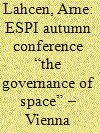

|
|
|
|
|
| Summary/Abstract |
The concept of governance has gained considerable attention over the last years. This is true for all parts of society, but very pronouncedly for space, where the increasing diversity of players is calling for ever better approaches to deal with the establishment and monitoring of policies and the management of humanity's most expansive global common. In this process, reference is almost always made to the term governance. In many cases, it is understood in rather specific technical and legal contexts, but it is also used very broadly and sometimes quite indiscriminately. In order to shed light on many of the hidden underlying dynamics of governance, the European Space Policy Institute (ESPI) addressed the topic at its 8th Autumn Conference on 11–12 September 2014. To capture the topic of governance from a wide variety of angles, speakers included representatives from space agencies, industry and academia – coming from different parts of the world. Main topics which were addressed during the conference included the relationship between space governance and international relations theory, the effects of liberalisation, regionalisation and geopolitics on space governance, and the evolution of space governance in the European context. This brief report captures the major findings of the two-day event and accentuates a number of trends recurring throughout the speakers' presentations.
|
|
|
|
|
|
|
|
|
|
|
|
|
|
|
|
| 12 |
ID:
127468
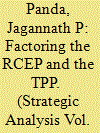

|
|
|
|
|
| Publication |
2014.
|
| Summary/Abstract |
The Regional Comprehensive Economic Partnership (RCEP) and the Trans-Pacific Partnership (TPP) are not necessarily two contending trade liberalising models, but their import and arrival have posed stiff political challenges for many countries, including China and India, Asia's two heavyweights. With these two initiatives, the regional trade of Asia is entering an interesting phase of liberalisation and integration. In fact, it is gradually becoming clear that the facets and nuances attached to these two trade liberalisation models will impact regional power politics massively in times to come. While the success of TPP hinges on the global economic authority of the US and how the negotiation process unfolds, the future dynamism of RCEP will depend heavily on how China and the Association of South-East Asian Nations (ASEAN) conduct their negotiation process and accommodate the interests of other regional powers, including India. Hitherto, it has been no secret that both RCEP and TPP will greatly affect and influence ASEAN and the role of its free trade agreement (FTA) partner countries, including China and India. In this regional stratagem, China-India relations may witness new dynamics and power politics in East Asia or in the broader Asia-Pacific region. It may also open a new window of opportunity for India's greater integration with the East Asia region. India needs to analyse carefully the efficacy and implications of both RCEP and TPP to see how far they serve New Delhi's own regional interests. RCEP may eventually facilitate India's 'Look East' policy more effectively than TPP. The former allows New Delhi to coordinate with ASEAN+6 countries more effectively, to which China has so far been fundamentally opposed.
|
|
|
|
|
|
|
|
|
|
|
|
|
|
|
|
| 13 |
ID:
116882
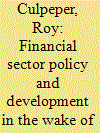

|
|
|
|
|
| Publication |
2012.
|
| Summary/Abstract |
Financial sector liberalisation has led to market failure on a massive scale. In industrial countries market failure led to the Great Financial Crisis that erupted in 2007 and continues into its fifth year. In developing countries liberalised financial markets have failed to provide access to financial services for the vast majority of households and firms. Small and medium-sized enterprises (smes), which are critical for employment, income creation and economic development, are particularly excluded by liberalised private financial markets. Market failure necessitates government intervention. To enhance smes' financial access requires an activist role by governments-not only by ensuring an enabling policy framework and financial infrastructure for smes, but also by supporting direct provision of financial services through national development banks and directed credit programmes. More broadly the crisis also provides an opening for a neo-structuralist development paradigm to replace the failed Washington Consensus. In this context activist financial sector policies should be integrated with industrial sector strategies.
|
|
|
|
|
|
|
|
|
|
|
|
|
|
|
|
| 14 |
ID:
098931
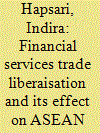

|
|
|
| 15 |
ID:
111161
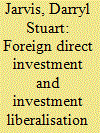

|
|
|
|
|
| Publication |
2012.
|
| Summary/Abstract |
This article explores the cooperative endeavours of the Association of Southeast Asian Nations (ASEAN) in the area of investment liberalisation. Investment liberalisation is variously associated with net positive effects on inflows of investment capital, technology transfer, employment, export generation, economic growth and development. As a net historical beneficiary of investment flows, the article hypothesises that ASEAN's stated commitment to investment liberalisation should by now be realising progress in each of four areas: (1) absolute reductions in national autonomy in relation to investment screening and conditionality provisions; (2) increased transparency in respect of member states' national investment regimes; (3) enhanced standardisation and codification of regulatory standards governing investment-related provisions across member states; and (4) enhanced centralised coordination and decision-making in respect of investment governance. Each of these areas is investigated in relation to ASEAN's three primary investment agreements and the ensuing regimes that govern investment provisions and policy practices among member states.
|
|
|
|
|
|
|
|
|
|
|
|
|
|
|
|
| 16 |
ID:
087021
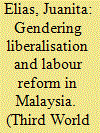

|
|
|
|
|
| Publication |
2009.
|
| Summary/Abstract |
This paper seeks to examine how and why gender needs to be brought into the analysis of state developmentalism in Asia. In doing so, the paper focuses on ongoing processes of labour market and industrial relations reform that have accompanied Malaysia's economic development since the early 1970s. Understanding these reforms from a gender perspective means that we must recognise both the significant contribution that women make to the growth of export manufacturing industries and the role that social relations of reproduction play in underpinning economic reform and transformation. The analysis explores how gendered social relations (of production and reproduction) have been central to the labour politics of Malaysia's state-led developmentalism and how ideas of maintaining 'competitiveness' through the attempts to transition to a more knowledge-centred economy have entailed particular roles and responsibilities for women. Attempts to maintain economic competitiveness in Malaysia have rested upon ideas concerning the need to integrate women more fully into the formal labour market and a greater recognition of the contribution of social relations of reproduction to capitalist accumulation. The article discusses some of the tensions and contradictions that have emanated from this policy shift.
|
|
|
|
|
|
|
|
|
|
|
|
|
|
|
|
| 17 |
ID:
162288
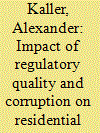

|
|
|
|
|
| Summary/Abstract |
The European electricity markets have been undergoing significant regulatory reforms since the introduction of the first liberalisation directive in 1996. Theory predicts that liberalisation promotes cost-efficient production and competition and hence leads to lower prices. The goal of this paper is to assess the impact of regulatory quality and non-compliance with the law on electricity prices in the context of electricity market reforms. We address problems of endogeneity by using the Blundell-Blond System GMM estimator and find that vertical integration and market concentration lower end-user prices, all else equal. Moreover, improving regulatory quality and reducing corruption, both have a negative impact on prices when holding other factors constant. The intensity of the reforms has limited impact on electricity prices when these reforms are introduced in an institutional environment characterised by high levels of corruption and low quality regulation.
|
|
|
|
|
|
|
|
|
|
|
|
|
|
|
|
| 18 |
ID:
112420
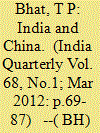

|
|
|
|
|
| Publication |
2012.
|
| Summary/Abstract |
India and China share many similarities. In the initial years, both adopted inward-looking import substitution policies with little consideration to foreign trade. During that period, China's foreign trade policy was more regimented than that of India's. As a result, both suffered on account of inefficiency in production and technological backwardness. China's 'open door' policy came into force in 1978, and India adopted liberalisation policies much later in 1991. China's economy grew much faster with an emphasis on export growth and attracting foreign direct investment. India, too, followed this approach in a calibrated manner. Domestic economic reform in China was carried out with a view to join the World Trade Organization (WTO). Entry of China into WTO unfolded trade liberalisation on an unprecedented scale. China's foreign market access enhanced its export growth to a phenomenal level. Now it has become the number one exporter, surpassing the US. India's exports also grew, but not as fast as China's. Trade instrument deployed by both the countries varies in nature and substance. China's export competitive power is well established in the global market, while India is yet to get to that level.
|
|
|
|
|
|
|
|
|
|
|
|
|
|
|
|
| 19 |
ID:
103034
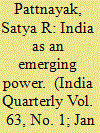

|
|
|
| 20 |
ID:
140055
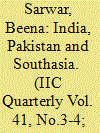

|
|
|
|
|
|
|
|